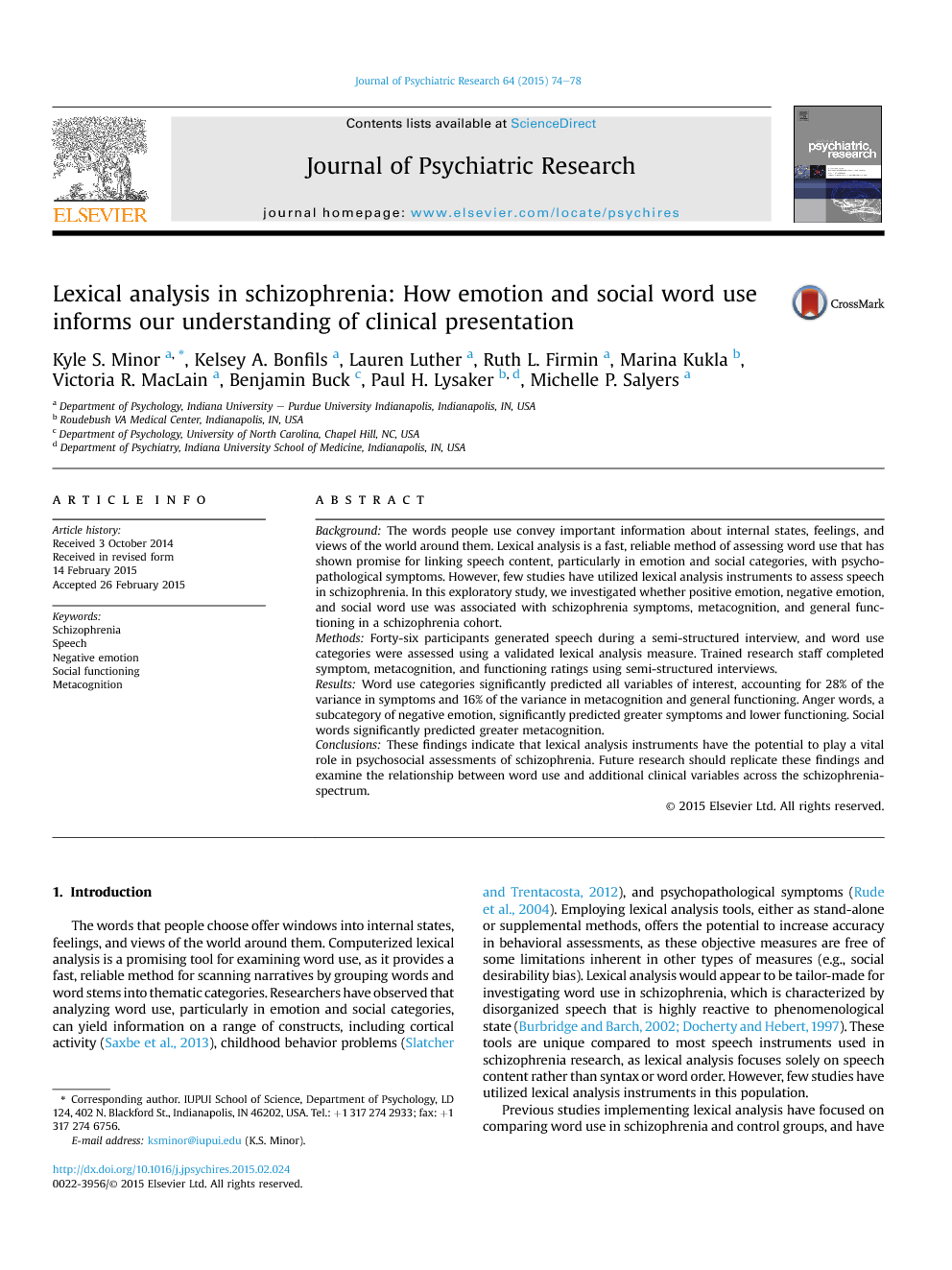Background
The words people use convey important information about internal states, feelings, and views of the world around them. Lexical analysis is a fast, reliable method of assessing word use that has shown promise for linking speech content, particularly in emotion and social categories, with psychopathological symptoms. However, few studies have utilized lexical analysis instruments to assess speech in schizophrenia. In this exploratory study, we investigated whether positive emotion, negative emotion, and social word use was associated with schizophrenia symptoms, metacognition, and general functioning in a schizophrenia cohort.
Methods
Forty-six participants generated speech during a semi-structured interview, and word use categories were assessed using a validated lexical analysis measure. Trained research staff completed symptom, metacognition, and functioning ratings using semi-structured interviews.
Results
Word use categories significantly predicted all variables of interest, accounting for 28% of the variance in symptoms and 16% of the variance in metacognition and general functioning. Anger words, a subcategory of negative emotion, significantly predicted greater symptoms and lower functioning. Social words significantly predicted greater metacognition.
Conclusions
These findings indicate that lexical analysis instruments have the potential to play a vital role in psychosocial assessments of schizophrenia. Future research should replicate these findings and examine the relationship between word use and additional clinical variables across the schizophrenia-spectrum.
The words that people choose offer windows into internal states, feelings, and views of the world around them. Computerized lexical analysis is a promising tool for examining word use, as it provides a fast, reliable method for scanning narratives by grouping words and word stems into thematic categories. Researchers have observed that analyzing word use, particularly in emotion and social categories, can yield information on a range of constructs, including cortical activity (Saxbe et al., 2013), childhood behavior problems (Slatcher and Trentacosta, 2012), and psychopathological symptoms (Rude et al., 2004). Employing lexical analysis tools, either as stand-alone or supplemental methods, offers the potential to increase accuracy in behavioral assessments, as these objective measures are free of some limitations inherent in other types of measures (e.g., social desirability bias). Lexical analysis would appear to be tailor-made for investigating word use in schizophrenia, which is characterized by disorganized speech that is highly reactive to phenomenological state (Burbridge and Barch, 2002 and Docherty and Hebert, 1997). These tools are unique compared to most speech instruments used in schizophrenia research, as lexical analysis focuses solely on speech content rather than syntax or word order. However, few studies have utilized lexical analysis instruments in this population.
Previous studies implementing lexical analysis have focused on comparing word use in schizophrenia and control groups, and have observed clinically significant differences between groups (Buck et al., 2015 and Cohen et al., 2009; Junghaenel et al., 2008; but also see St-Hilaire et al., 2008). There has been little research within patient groups to investigate whether word use is linked with schizophrenia symptoms. Cohen et al. (2009) published the lone study on this topic, observing that patients with schizophrenia high in anhedonia, a negative symptom characterized by reduced positive affect expression, used significantly more negative emotion words when discussing pleasant topics than those low in anhedonia or controls. Cohen and colleagues focused specifically on anhedonia; to our knowledge, no previous study has investigated whether word use is associated with the full spectrum of schizophrenia symptoms.
To enhance the clinical utility of lexical analysis instruments, it is imperative to examine whether word use can inform our understanding of commonly observed deficits in schizophrenia, such as metacognition and general functioning, where affective and social processes play critical roles. Metacognition, which is often defined as thinking about thinking (Flavel, 1979 and Frith, 1992), involves a range of activities from discrete acts that require recognizing specific thoughts and feelings to synthetic acts that necessitate combining an array of intentions, thoughts, feelings, and connections between events into complex representations of others (see Gumley, 2011, Lysaker and Dimaggio, 2014 and Lysaker et al., 2011). To demonstrate metacognition, one must exhibit an ability to integrate cognitive and emotional experiences in the moment and in memory, as well as recognize emotions in oneself and others. These abilities are often examined in schizophrenia by assessing the speech narratives of patients, as those with metacognitive deficits are likely to demonstrate greater impoverishment through language. Lexical analysis instruments offer the potential to examine speech narratives more deeply in order to identify moments when core psychological processes, such as emotional or social processes, are engaged. Despite the importance of emotional and social processes to metacognition and the common use of speech narratives during assessment, no previous study has investigated whether significant overlap exists between metacognition and emotion or social word use.
Regarding functioning, greater levels of negative emotion are significantly associated with lower functioning in schizophrenia (Blanchard et al., 1998). Gauging social relationships is also a key component of functional assessments. Examining associations between functioning and emotion and social word use, compared to other categories, could inform our understanding of how lexical analysis can be utilized to assess general functioning in schizophrenia. If significant relationships are observed, this would offer preliminary evidence for the utility of lexical analysis instruments as an objective screening measure of general functioning in patients.
This is the first study to implement lexical analysis to explore relationships between word use and overall symptoms, metacognition, and general functioning in individuals with schizophrenia. These relationships were examined across fifteen word use categories, spanning themes related to psychological processes and personal concerns. We expected word use to significantly predict all three clinical variables, and that emotion and social word categories would be the strongest individual predictors measured in this study.


